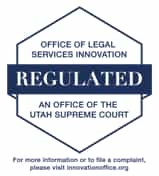Criminal Tax Defense Attorneys
Experienced in Tax Law & Criminal Defense to Fully Protect Your Interests
Pearson Butler defends clients across Utah who are being investigated for or have been charged with tax evasion, tax fraud, failure to file tax returns, and failure to pay taxes before the United States Department of Justice (“DOJ”) and the Internal Revenue Service. The DOJ incarcerates a high percentage of tax offenders and assesses large fines. Pearson Butler’s defense attorneys strive to help clients avoid criminal proceedings, reduce criminal penalties, and mitigate civil tax assessments.
Do not become another statistic. Contact Pearson Butler immediately for experienced counsel in the face of tax crime charges. Call (800) 265-2314 to get started.
Commonly Prosecuted Tax Crimes
The IRS prosecutes a variety of tax crimes, including:
- Failing to file an income tax return
- Falsifying an income tax return
- Under-reporting income
- Making false claims or statements
- Evading taxes by transferring assets
In these matters, the IRS must prove “beyond a reasonable doubt” that the taxpayer committed the crime by failing to properly report tax liability that the taxpayer owes.
Establishing Guilt for a Tax-Related Crime
The IRS and other tax authorities may use a variety of methods to establish a tax crime:
- Direct Evidence: the IRS or taxing authority will attempt to establish that the tax return improperly reports transactions.
- Net-Worth: the IRS or taxing authority will attempt to show that the taxpayer failed to report income.
- Expenditure/Lifestyle: the IRS or taxing authority will attempt to show that the taxpayer was able to spend more on goods and or services than the amount of gross income reported on the tax return being reviewed.
- Bank Deposits: the IRS or taxing authority will attempt to show that the taxpayer deposited more money into a bank account than was reported on a tax return.
What Should I Do If I’m Approached by the IRS?
If you’re approached by the IRS or any government agent or authority regarding an alleged tax crime or criminal investigation for a tax-related offense, contact an attorney immediately. Do not make the serious mistake of ignoring IRS correspondence or communicating with the IRS and trying to resolve it on your own – even if you know you are innocent or believe the error is insignificant. Statements to IRS Special Agents and law enforcement can be used later on to prosecute you. In addition, the IRS and other taxing agencies may commence a civil case once the criminal investigation is concluded.
Contact Pearson Butler online or call (800) 265-2314 to schedule a consultation with a defense lawyer today.
*Sentence includes confinement to federal prison, halfway house, home detention, or some combination thereof.





.jpg)








